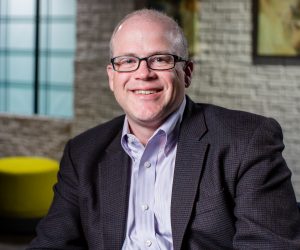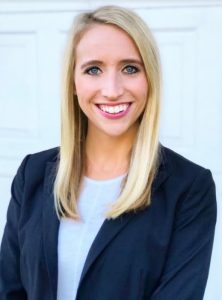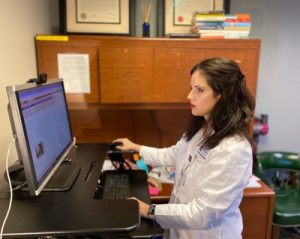CSP Team Note: This post was originally published on Novant Health’s Healthy Headlines. We thank them for allowing us to share it with you. To subscribe to Novant Health’s Healthy Headlines newsletter, click here. Click here to find a physician.Novant Health is also offering a self-guided assessment tool to help patients determine if they should seek care for COVID-19. (Note: This assessment is not a substitute for professional medical advice, diagnosis or treatment and should not be used if patients are experiencing a life-threatening emergency.)
‘In just 48 hours, we advanced 5 years into the future’
By Guest Blogger Roland Wilkerson, Novant Health
The promise of virtual medical visits that allow patients to connect with their doctors without ever leaving home has long been held out as the future of medicine.
But the futuristic vision has been slow to materialize. Insurance companies and the government often declined to cover them, many doctors were wary and patients often not quite sure how to take advantage of it.
Then came the coronavirus. And now that future might be here.
Consider this: In the last 12 months, Novant Health providers conducted less than 1,000 video visits. Between March 12 and March 31, they’ve done more than 18,000 and scores of new appointments or on-demand visits are getting booked by the hour. The figures stunned doctors, nurses and administrators across Novant Health.
“In just 48 hours, we advanced five years into the future,” said Dr. Hank Capps, senior vice president and chief digital health and engagement officer for Novant Health.
To be sure, the organization has worked painstakingly for years to build one of the strongest digital foundations in the country, leading the way around the development of its MyChart capabilities that let patients book appointments, check their medical records and communicate directly with their doctor, as well as introducing e-visits and video visits almost a decade ago. Today, more than 1 million people use these tools to stay on top of their health care.
Despite changes in the environment to encourage more usage of technology, doctors and patients only slowly warmed to the notion of virtual visits.
But then coronavirus storm clouds began piling along the horizon. Health leaders raised the alarm and public perception started shifting by the minute. The benefits quickly snapped into focus: Patients could keep their distance from others who might have the disease, and doctors could help control the spread by thinning out crowded waiting rooms.
“Patients wanted to stay home and then — fast forward — they were told to stay home,” said Stephanie Landry, senior director of digital health and engagement for Novant Health. “It was a combination of the demand and us realizing we had to adapt to literally meet patients where they are.”
Another key factor came in early March when Congress approved an $8.3 billion emergency coronavirus plan that reimbursed virtual care for those on Medicare, the government program that treats people 65 and older.
Novant Health has been planning for this moment for years. It quickly launched a training program to help squadrons of doctors, physician assistants, nurse practitioners, nurses and clinics learn a new way of care delivery almost overnight. Teams raced to organize virtual training sessions that were held on March 19 and March 25, when more than 1,600 providers learned how to use the technology and navigate last-minute enhancements made in electronic health records to offer these services.
They also set up virtual conference lines where doctors could reach out in real time to ask questions and get help ironing out snags during virtual visits. One-on-one training is also available for providers who want it. Overall, more than 2,500 providers are now available via virtual services, Landry said. In some cases, doctors are meeting patients virtually from their own homes.
“So far, so good, on our front,” said Dr. Genevieve Brauning, a family medicine physician at Novant Health SouthPark Family Physicians. At the moment, she said, nearly all the patients are being seen via virtual visits, roughly 80 to 100 a day.
“We hit the ground running because we’d already been doing video visits,” she said. “My overall feeling is that they’ve really been happy to connect this way.”
Novant Health has a variety of virtual visits options for patients that range from an e-visit to scheduled and on-demand video visits. All require a MyChart account, which is free.
The newest option is an enhanced video visit using TytoHome, a lightweight, portable medical exam kit. Using TytoHome, patients can connect to a Novant Health provider who can virtually examine the heart, lungs, skin, ears, throat and abdomen from wherever they are – potentially eliminating a rush to the emergency room or the doctor’s office.
Novant Health recently dropped the price from $299 to $149 in an effort to allow access to the tool to the broader community as more patients are seeking care from their homes. Sales started spiking on March 12, with more than 800 purchases in the last two weeks. Overall, nearly 1,600 devices are now in the market, Landry said.
What’s next? Landry said changes in reimbursement rules from private insurers and the government are arriving daily and a team is updating those across the system. Confidence among patients and providers is growing daily.
One hesitant doctor has passed along that “I’m still able to take care of my patients in the middle of this crisis and I love it.” Another: “I now know my future.”
At the same time, Capps emphasized that getting the right level of care will still include in-person visits in many cases. Helping patients navigate to the right care at the right time will continue to be vital.
“In these extraordinary times with so many unknowns, it is impossible to predict exactly how care delivery will continue to evolve as we adjust in real-time to meet the needs of patients,” Capps said. “But the way we deliver care will never exactly be the same after the pandemic.”
Novant Health team members are on the front lines in the battle against the COVID-19 pandemic. Novant Health Foundation has established a new fund dedicated to supporting our teams, as well as the overall response to the pandemic. Contributions will support team members and help fund testing and medication to support patient care, as well as medical supplies. To donate, click here.
Caption: Dr.David Milbourn of Novant Health Elizabeth Pediatrics met with parents Gretchen and Mike Lopez for a wellness visit for 2-year-old Elise. Both parents are working from home at the moment.
Novant Health has a 24-hour helpline to answer COVID-19 questions. The number is 877-499-1697 or 877-9NOVANT.
If you think you may be at risk for COVID-19, use the Novant Health online coronavirus assessment tool.
Novant Health
Healthy Headlines
Facebook
Instagram
Twitter
YouTube







